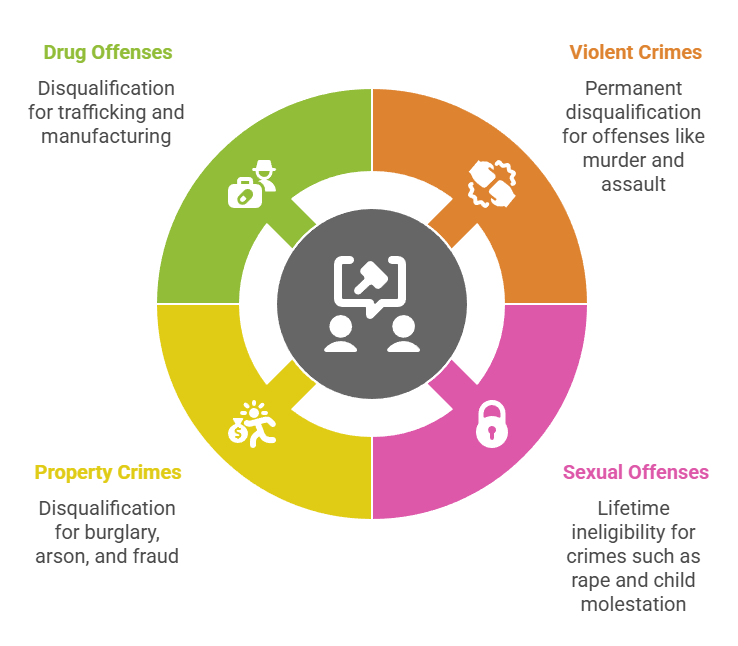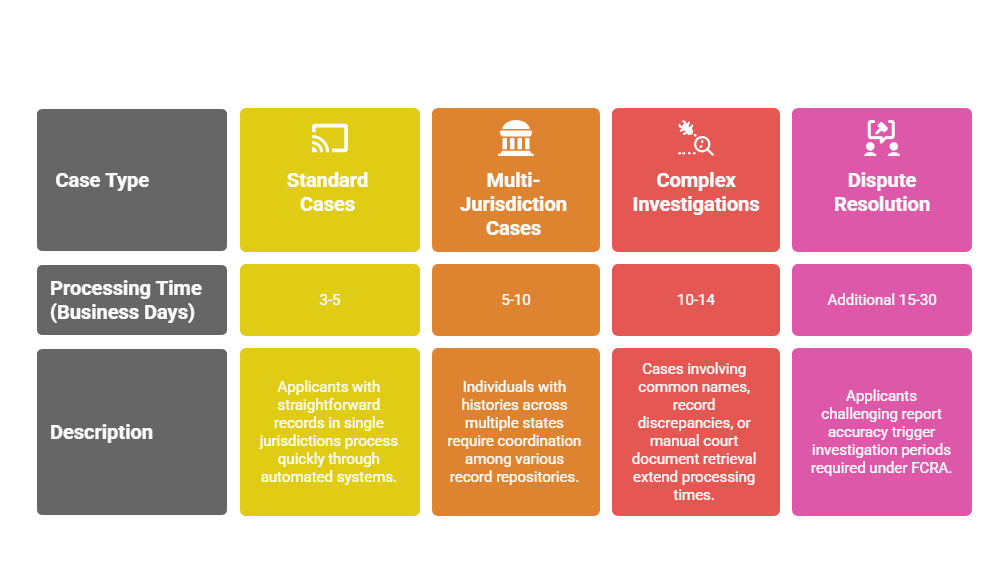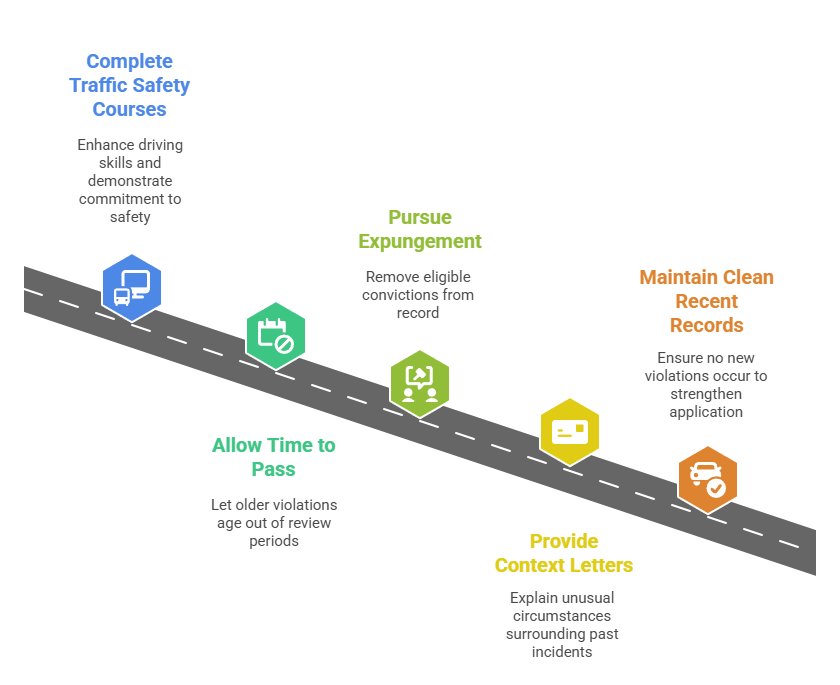Georgia's rideshare background check requirements operate under a dual-layer compliance framework mandated by the Georgia Public Service Commission (PSC), requiring both state-level screening standards and platform-specific policies that TNCs must navigate simultaneously. This comprehensive guide clarifies the complex regulatory landscape established under O.C.G.A. § 46-1-1 through § 46-1-8, helping transportation network companies, fleet managers, and prospective drivers understand the specific disqualifying offenses, screening timelines, and documentation requirements necessary for legal operation in Georgia's rideshare market.
Key Takeaways
- Georgia requires all TNC drivers to pass a comprehensive background check covering both criminal history and driving records before transporting passengers, as mandated by the Georgia Public Service Commission regulations.
- The Georgia PSC requires criminal background checks to review at least seven years of history, screening for violent crimes, sexual offenses, property crimes, and drug-related felonies that automatically disqualify applicants.
- Driving record checks must examine at least three years of history, with automatic disqualification for DUI convictions, reckless driving, driving without insurance, leaving accident scenes, and accumulating four or more moving violations within 36 months.
- Transportation network companies operating in Georgia must use accredited third-party screening providers that comply with Fair Credit Reporting Act (FCRA) requirements and maintain documentation for regulatory audits.
- Individual rideshare platforms like Uber and Lyft often impose stricter background check standards than state minimums, creating additional compliance layers for Georgia TNC operators.
- Georgia law prohibits TNCs from hiring drivers with convictions for human trafficking, sexual exploitation, or crimes against children regardless of how long ago the offense occurred.
- Background check results must be reviewed and approved before drivers can be activated on any rideshare platform, and TNCs must conduct annual re-screenings to maintain compliance with Georgia PSC requirements.
- Fleet management companies and TNC operators face potential penalties including fines, permit revocation, and legal liability if they fail to properly screen drivers according to Georgia's rideshare background check standards.
Understanding Georgia's TNC Regulatory Framework
Georgia established its transportation network company regulations through comprehensive legislation that created specific operational requirements for rideshare platforms. The Georgia Public Service Commission serves as the primary regulatory authority, overseeing TNC compliance with background screening standards. This framework ensures passenger safety while providing clear guidelines for companies operating in the state.
Georgia PSC Authority Over Rideshare Companies
The Georgia Public Service Commission exercises regulatory jurisdiction over all TNCs operating in the state under O.C.G.A. § 46-1-1 et seq. This statutory framework requires companies to obtain TNC permits before facilitating rideshare services and mandates adherence to specific background check protocols. The PSC conducts compliance audits, investigates consumer complaints, and has authority to impose sanctions ranging from monetary penalties to permit suspension. Transportation network companies must submit annual compliance reports demonstrating their background check processes align with state standards, creating a documented trail of due diligence.
State Requirements vs. Platform-Specific Policies
Georgia's rideshare background check landscape operates on two distinct levels that TNCs must navigate simultaneously. State law establishes minimum screening standards that apply uniformly across all rideshare platforms, creating a baseline compliance floor. However, major platforms like Uber, Lyft, and regional TNC operators typically implement more stringent screening criteria that exceed state minimums.
This dual-layer approach means that a driver might technically meet Georgia PSC requirements but still face disqualification under a specific platform's internal policies. Fleet management companies coordinating with multiple rideshare platforms must ensure their screening processes satisfy the most restrictive standards applicable to their operational footprint.
Municipal Ordinances and Local Variations
While Georgia's state law preempts most local regulations regarding TNC operations, certain municipalities maintain additional permitting requirements. Cities like Atlanta, Savannah, and Augusta may require drivers to obtain local business licenses separate from state TNC compliance. These municipal requirements typically don't impose additional background screening beyond state mandates but create supplementary administrative obligations. Transportation network companies should verify local requirements in their specific operational areas to ensure comprehensive regulatory compliance across all jurisdictions where they facilitate rideshare services.
Criminal Background Check Requirements for Georgia Rideshare Drivers
Georgia's TNC regulations establish comprehensive criminal history screening requirements designed to protect passenger safety by identifying applicants with disqualifying criminal convictions. The state mandates both the scope of criminal records review and specific offense categories that automatically prevent driver eligibility. Understanding these requirements helps TNCs maintain compliance while providing clarity for prospective drivers evaluating their eligibility.
Seven-Year Lookback Period and Scope
Georgia law requires criminal background checks for rideshare drivers to examine at least seven years of history, though many screening providers and platforms extend this period further. The review must include multi-jurisdictional criminal record searches covering county, state, and federal databases to capture offenses that may have occurred in different locations. This comprehensive approach addresses the mobile nature of both drivers and criminal records.
TNCs must use screening providers capable of accessing national criminal database systems, state repositories, and county court records to satisfy this multi-level search requirement. Transportation network companies should verify that their screening partners maintain current access to all necessary databases and update their systems regularly to reflect the most recent criminal justice information available.
Disqualifying Criminal Offenses
Georgia's rideshare background check standards identify specific criminal offense categories that result in automatic driver disqualification. The state takes a comprehensive approach to protecting passengers from potential harm by screening for a wide range of serious offenses. TNCs must understand these categories to properly evaluate applicant eligibility and maintain compliance with state regulations.

Violent Crimes:
- Murder and Manslaughter: Any conviction for homicide offenses results in permanent disqualification from rideshare driving.
- Assault and Battery: Physical violence convictions prevent eligibility due to passenger safety concerns.
- Kidnapping and Abduction: Offenses involving unlawful restraint or movement of persons create automatic disqualification.
- Domestic Violence: Convictions for violence against family or household members bar applicants from driving.
Sexual Offenses:
- Rape and Sexual Battery: Any sexual assault conviction permanently disqualifies candidates from TNC participation.
- Child Molestation: Crimes involving sexual contact with minors result in lifetime ineligibility.
- Sex Offender Registration: Any offense requiring registration as a sex offender prevents rideshare approval.
Property and Financial Crimes:
- Burglary and Robbery: Breaking and entering or theft involving force disqualifies applicants within the lookback period.
- Arson: Intentional fire-setting convictions bar individuals from driving.
- Identity Theft and Fraud: Financial crimes affecting trust prevent rideshare eligibility.
Drug-Related Offenses:
- Trafficking and Distribution: Felony convictions for selling or distributing controlled substances disqualify candidates.
- Manufacturing: Operating illegal drug production facilities results in permanent ineligibility.
- Possession Considerations: Simple possession charges may be evaluated case-by-case depending on platform policies.
These categories create a comprehensive safety net for passengers while providing clear guidance for applicants. TNCs should maintain updated policy documents reflecting current disqualifying offense classifications to ensure consistent application across all driver screenings.
Pending Charges and Arrest Records
The treatment of pending criminal charges and arrest records without convictions represents a complex area within Georgia rideshare background screening. Under Fair Credit Reporting Act provisions, background check providers must report criminal records accurately and cannot include arrests more than seven years old that did not result in conviction. However, TNCs may consider pending charges when making hiring decisions, particularly for serious offenses that would be disqualifying if convicted.
Many platforms place applicants with pending charges in a suspended status pending case resolution. Transportation network companies must balance passenger safety considerations against applicants' legal presumption of innocence, creating policies that address pending matters while respecting due process rights.
Driving Record Screening Standards
Georgia mandates thorough driving history reviews for all rideshare driver applicants, recognizing that safe driving records directly correlate with passenger safety. The state's TNC regulations establish specific lookback periods and disqualifying violations that prevent driver eligibility. These standards ensure that only individuals with demonstrated safe driving histories can transport passengers through rideshare platforms.
Three-Year Driving History Review
The Georgia PSC requires driving record checks covering at least the most recent three years of an applicant's history. This review examines both Georgia Department of Driver Services records and out-of-state driving histories for individuals who held licenses in other jurisdictions. The screening must verify valid licensure status, identify any license suspensions or revocations, and document traffic violations and accidents.
Transportation network companies must obtain Motor Vehicle Records (MVRs) through approved channels that comply with the Driver's Privacy Protection Act (DPPA). The three-year window captures recent driving behavior patterns while allowing individuals to demonstrate rehabilitation from older infractions. This timeframe balances the need for current safety information with fairness for applicants who have improved their driving habits.
Automatic Driving Disqualifications
Specific driving violations create automatic disqualification from Georgia rideshare driver eligibility. The state recognizes that certain traffic offenses indicate dangerous driving patterns or irresponsible behavior incompatible with passenger transportation. Understanding these disqualifying factors helps applicants assess their eligibility before beginning the application process.
| Disqualifying Violation | Impact Period | Reason for Disqualification |
| DUI/DWI Convictions | Within 7 years | Demonstrates impaired driving endangering passengers |
| Reckless Driving | Within 3 years | Indicates dangerous driving behavior |
| License Suspension/Revocation | Any current or within 3 years | Shows failure to maintain legal driving privileges |
| Hit and Run | Within 7 years | Reflects irresponsibility and legal violations |
| Driving Without Insurance | Within 3 years | Demonstrates noncompliance with financial responsibility laws |
| Multiple Moving Violations | 4+ within 36 months | Pattern of unsafe driving behavior |
These disqualifications apply across all major platforms operating in Georgia. Some companies impose even stricter standards, extending lookback periods or adding additional disqualifying violations beyond state minimums.
License Requirements and Classifications
Georgia requires rideshare drivers to maintain valid Class C driver's licenses for at least one year before TNC approval. Commercial driver's licenses (CDL) are not required for standard rideshare operations since drivers transport passengers in their personal vehicles. However, drivers must meet age requirements—typically 21 years or older for most platforms, though Georgia state law allows 18-year-old drivers for certain TNC operations.
The license must be issued by a U.S. state or territory; international driver's licenses alone do not satisfy Georgia TNC requirements. Transportation network companies must verify license validity and classification during initial screening and through periodic reverification processes.
Background Check Process and Timeline
Understanding the procedural aspects of Georgia's rideshare background check system helps TNCs manage driver onboarding efficiently while maintaining compliance. The screening process involves multiple steps, specific timelines, and coordination between various parties. Efficient processes reduce time-to-activation for qualified drivers while ensuring thorough vetting that protects passenger safety.
Third-Party Screening Provider Requirements
Georgia law requires TNCs to conduct background checks through accredited third-party screening providers rather than performing in-house reviews. These screening companies must comply with Fair Credit Reporting Act standards, maintain Consumer Reporting Agency (CRA) accreditation, and demonstrate ability to access comprehensive criminal and driving databases. Major screening providers serving the Georgia TNC market include Checkr, Sterling, HireRight, and similar companies specializing in transportation industry background checks.
The use of certified third-party providers creates procedural consistency and ensures proper record access. It also establishes legal compliance with consumer protection laws governing background investigations. TNCs should evaluate screening providers based on database access capabilities, turnaround times, accuracy rates, and customer support quality.
Applicant Consent and FCRA Compliance
Before initiating background checks, TNCs must obtain clear written consent from applicants as required by the Fair Credit Reporting Act. This consent process must include standalone disclosure documents explaining that background checks will be conducted, separate from employment applications or other forms. Applicants must receive a Summary of Rights document explaining their protections under FCRA. The consent documentation creates a legal foundation for conducting background investigations while protecting applicant rights.
If adverse action (application denial) results from background check findings, TNCs must follow specific procedures. Companies must provide pre-adverse action notices with copies of background reports, allowing applicants the opportunity to dispute inaccuracies. Final adverse action notices must explain the reasons for denial and inform applicants of their rights to challenge findings. These FCRA compliance steps protect applicant rights while creating documented processes that withstand legal scrutiny.
Typical Processing Timelines
Georgia rideshare background checks typically complete within specific timeframes depending on case complexity. Understanding these timelines helps TNCs set realistic expectations with applicants and plan recruitment cycles effectively. Various factors influence processing speed, from database response times to the complexity of an applicant's history.

Expedited processing is sometimes available through screening providers for urgent hiring needs, though this may involve additional costs. Understanding typical timelines helps fleet managers plan recruitment cycles and manage driver availability effectively.
Ongoing Compliance and Annual Re-Screening
Georgia's TNC regulations don't treat background screening as a one-time requirement but instead mandate ongoing compliance monitoring throughout a driver's tenure. This continuous oversight ensures that drivers maintain eligibility standards after initial approval. TNCs must establish systems to track and execute these ongoing requirements while managing the administrative burden across potentially large driver networks.
Annual Background Check Updates
The Georgia Public Service Commission requires TNCs to conduct annual background check updates for all active drivers. These updates refresh both criminal history and driving record reviews, identifying new disqualifying offenses, traffic violations, or license issues that emerged after initial approval. Transportation network companies must establish systems to track when each driver's annual screening is due and ensure timely completion.
Drivers whose annual screenings reveal disqualifying issues must be immediately deactivated from the platform pending resolution or permanent removal. This ongoing verification requirement differentiates Georgia from states with less stringent TNC oversight. Fleet managers should implement automated tracking systems that flag upcoming renewal deadlines and initiate screening processes proactively to prevent lapses in driver compliance status.
Continuous Monitoring Programs
Beyond annual screenings, many TNCs and screening providers implement continuous monitoring programs that flag new criminal charges or driving violations as they occur. These programs access criminal court databases and driving record systems to identify relevant events in near-real-time. Continuous monitoring provides earlier detection of issues compared to annual updates alone, allowing TNCs to respond immediately to serious disqualifying events.
While Georgia regulations don't explicitly mandate continuous monitoring beyond annual reviews, the practice has become industry standard among major platforms. Fleet management companies should evaluate whether implementing continuous monitoring alongside annual screenings provides operational and safety advantages for their specific business models.
Driver Self-Reporting Obligations
Most TNC platforms require drivers to self-report certain incidents between official background check updates. Drivers typically must notify the platform within specified timeframes (often 24-72 hours) of arrests, criminal charges, traffic violations, license suspensions, or accidents. Self-reporting policies create contractual obligations separate from company-initiated screening processes. However, TNCs cannot rely solely on driver self-reporting to satisfy Georgia's background check requirements.
Transportation network companies should clearly communicate self-reporting policies during driver onboarding and include these obligations in driver agreements. Platforms should also implement systems to verify self-reported incidents and take appropriate action based on the nature and severity of disclosed events.
Special Considerations for Fleet Management Companies

Fleet management companies that coordinate drivers across multiple TNC platforms face unique compliance challenges in Georgia's rideshare market. These organizations must navigate varying platform requirements while maintaining state regulatory compliance. Successfully managing multi-platform operations requires sophisticated systems and comprehensive understanding of overlapping requirements from different sources.
Multi-Platform Compliance Coordination
Fleet managers partnering with multiple rideshare platforms must ensure their screening processes satisfy the most restrictive requirements across all platforms. Since Uber, Lyft, and regional TNCs may each maintain different disqualification criteria beyond Georgia's state minimums, fleet operators should implement screening protocols that meet the highest applicable standards. This approach prevents situations where drivers qualify for one platform but face disqualification from another.
Centralized screening programs using consistent standards across all drivers simplify compliance management. Fleet management companies should conduct regular audits comparing their screening criteria against current platform requirements to identify any gaps requiring policy updates. Maintaining a master requirements matrix helps track the most stringent standards across all operational partnerships.
Liability and Negligent Hiring Considerations
Transportation network companies and fleet managers face potential legal liability for negligent hiring if they fail to properly screen drivers according to Georgia's requirements. Georgia courts recognize negligent hiring claims when companies knew or should have known about a driver's unfitness for the position. Comprehensive background screening following state standards provides important legal protection against such claims.
Screening alone may not provide complete liability protection. TNCs must also document their screening processes, maintain records proving compliance, and establish response protocols for addressing concerning background findings. Consultation with legal counsel specializing in transportation law helps fleet managers understand their specific liability exposure and implement appropriate risk mitigation strategies.
Cost Management and Screening Efficiency
Background check costs represent a significant operational expense for fleet management companies, particularly those managing large driver networks with annual re-screening requirements. Individual background checks typically cost $20-50 depending on scope and provider, creating substantial aggregate expenses. Fleet operators should negotiate volume pricing with screening providers to reduce per-check costs.
| Cost Factor | Standard Approach | Optimized Strategy |
| Per-Screen Cost | $35-50 individual pricing | $20-30 with volume discounts |
| Annual Re-Screens | Full-price repeat checks | Negotiated renewal rates |
| Multi-Platform Duplication | Separate checks per platform | Centralized screening accepted by multiple platforms |
Implementing efficient application tracking systems minimizes redundant screenings and ensures timely annual updates without gaps. Balancing cost efficiency with compliance quality requires careful vendor selection and process optimization.
Common Application Issues and Resolutions
Georgia rideshare background check processes sometimes encounter complications requiring problem-solving approaches. Understanding common issues helps TNCs and applicants navigate challenges effectively. Proactive awareness of potential complications allows both companies and drivers to address problems early in the screening process rather than facing delays or denials later.
Addressing Background Check Errors
Background check reports occasionally contain inaccuracies due to name confusion, incorrect data entry, or database errors. When applicants identify mistakes in their background reports, they have rights under the Fair Credit Reporting Act to dispute inaccuracies with the screening provider. The dispute process requires the Consumer Reporting Agency to investigate claimed errors within 30 days.
- Common Error Types: Name mix-ups with individuals who have similar names, outdated information reflecting expunged records, incorrect offense classifications, or records from different individuals entirely.
- Documentation Needed: Court records showing case dismissals, identity verification distinguishing applicants from similarly-named individuals, expungement orders, or corrected official records.
- Resolution Process: Applicants submit disputes to the CRA with supporting documentation, investigations proceed within 30 days, reports are corrected if errors are verified, and TNCs reconsider applications based on corrected information.
TNCs must pause adverse action decisions during active disputes. Establishing clear dispute resolution procedures protects applicant rights while maintaining process integrity.
Out-of-State Conviction Considerations
Applicants with criminal histories from other states sometimes encounter complications when Georgia TNCs assess offense equivalency. A conviction from another jurisdiction must be evaluated to determine whether it would constitute a disqualifying offense under Georgia law. This analysis requires understanding both the elements of the out-of-state offense and how Georgia categorizes comparable crimes.
Some offenses classified as misdemeanors in permissive states might be felonies under Georgia law, affecting disqualification determinations. TNCs should work with legal counsel or compliance specialists experienced in multi-state criminal law comparison when evaluating ambiguous out-of-state convictions.
Expungement and Record Restriction Impact
Georgia law allows certain criminal records to be expunged or restricted under specific circumstances, potentially affecting how these records appear in background checks. Successfully expunged records should not appear in background reports and cannot legally be considered in employment decisions. Record restrictions under Georgia's Second Chance laws limit access to certain conviction information for employment screening purposes.
Applicants with expunged or restricted records should verify that screening reports correctly reflect these legal statuses. If expunged records improperly appear in background checks, applicants can dispute the inclusions and should prevail since reporting these records violates legal restrictions. TNCs must respect legal limitations on considering expunged or restricted records.
Resources for Prospective Rideshare Drivers
Individuals considering rideshare driving in Georgia benefit from understanding how to prepare for and navigate the background check process. Proactive steps improve approval prospects and reduce processing delays. Taking control of the screening process by understanding requirements and preparing documentation helps applicants move through the system efficiently.
Obtaining Personal Background Reports
Prospective drivers can order personal background checks before applying to TNC platforms, allowing them to identify potential issues proactively. Services like the Georgia Crime Information Center (GCIC) provide official criminal history reports for Georgia residents. The Georgia Department of Driver Services offers driving history reports showing traffic violations and license status.
National background check services like GoodHire or Checkr also offer consumer-facing products. Reviewing personal background information before applying helps candidates understand what TNCs will see, identify any errors requiring correction, and realistically assess their approval likelihood.
Improving Approval Chances
Applicants with borderline background issues can take steps to improve their rideshare approval prospects. While serious disqualifying offenses typically cannot be overcome, applicants with minor or aging issues may improve outcomes through strategic preparation. Understanding which factors are within an applicant's control helps focus improvement efforts effectively.

- Complete traffic safety courses to demonstrate commitment to safe driving despite past violations.
- Allow additional time to pass beyond minimum lookback periods to age out marginal offenses.
- Pursue expungement or record restriction for eligible convictions to remove barriers to approval.
- Provide context letters explaining unusual circumstances surrounding past incidents for discretionary review.
- Maintain clean recent records while older violations age out of review periods to strengthen applications.
These strategies work best for minor infractions near the edge of lookback periods. Major disqualifying offenses generally cannot be mitigated through these approaches.
Alternative Transportation Industry Opportunities
Individuals who don't qualify for traditional rideshare driving due to background check issues may find opportunities in related transportation sectors. Different segments of the mobility industry maintain varying screening standards based on their specific risk profiles and regulatory frameworks. Exploring these alternatives helps individuals with disqualifying records find transportation industry opportunities matching their qualification profiles.
| Industry Segment | Typical Background Requirements | Key Differences from Rideshare |
| Food/Grocery Delivery | Moderate—focuses primarily on driving record | Less emphasis on criminal history; no passenger transport |
| Package Delivery | Variable by company—some stricter, some more lenient | Different liability considerations; property vs. passenger focus |
| Medical Transport | Strict—often exceeds rideshare standards | Healthcare regulations add additional requirements |
| Traditional Taxi Services | Set by local jurisdictions—varies significantly | Municipal licensing may have different disqualifying factors |
Researching specific requirements for each alternative helps applicants identify realistic opportunities. Some segments may provide pathways for individuals whose records prevent rideshare eligibility.
Conclusion
Georgia's rideshare background check requirements create a comprehensive regulatory framework that protects passenger safety while establishing clear operational standards for transportation network companies. Successfully navigating these requirements demands understanding of both state Public Service Commission mandates and individual platform policies that often exceed minimum standards. Fleet management companies and TNC operators must implement robust screening processes using accredited providers, maintain meticulous compliance documentation, and conduct annual re-screenings throughout driver tenure. Prospective drivers benefit from proactively understanding disqualifying factors and preparing their records before applying, while those with challenging backgrounds should explore expungement options or alternative transportation opportunities within Georgia's diverse mobility ecosystem.
Frequently Asked Questions
What disqualifies you from driving for rideshare companies in Georgia?
Disqualifying factors include violent crime convictions, sexual offenses, crimes against children, DUI convictions, reckless driving, and four or more moving violations within three years. Additional disqualifiers include driving without insurance, license suspensions, and felony drug trafficking within the seven-year lookback period. Specific platforms may impose additional disqualifying criteria beyond these state minimums.
How long does a Georgia rideshare background check take?
Most Georgia TNC background checks complete within 3-7 business days for straightforward cases. Complex situations involving multiple jurisdictions, record verification issues, or disputes may extend processing to 10-14 days. Factors affecting timeline include screening provider workload, court record accessibility, and the completeness of applicant information submitted.
Do Georgia rideshare background checks look at out-of-state records?
Yes, Georgia requires comprehensive multi-jurisdictional background checks that include criminal history and driving records from all states where an applicant previously resided or held driver's licenses. National database searches capture convictions and violations that occurred outside Georgia. This ensures thorough evaluation of an applicant's complete history regardless of geographic location.
How often do rideshare companies update background checks in Georgia?
Georgia regulations mandate annual background check updates for all active rideshare drivers, requiring both criminal history and driving record re-screening. Many platforms also implement continuous monitoring programs that flag new charges or violations throughout the year. These systems provide additional safety oversight beyond minimum state requirements.
Can you drive for Uber or Lyft in Georgia with a DUI on your record?
A DUI conviction within the lookback period (typically seven years) generally disqualifies applicants from rideshare driving in Georgia. Both Uber and Lyft maintain policies prohibiting drivers with recent DUI convictions. As the conviction ages beyond platform-specific lookback periods, eligibility may be reconsidered depending on individual circumstances.
What is the difference between Georgia state requirements and platform requirements for rideshare background checks?
Georgia state law establishes minimum screening standards that all TNCs must meet, including lookback periods and specific disqualifying offenses. Individual platforms like Uber and Lyft often implement stricter policies that go beyond state minimums. TNCs must satisfy both state regulatory requirements and their own internal screening standards.
How do I dispute errors on my Georgia rideshare background check?
Under the Fair Credit Reporting Act, applicants can dispute inaccuracies directly with the screening provider that produced the report. Submit a formal dispute with supporting documentation such as court records, identity verification, or expungement orders. The screening company must investigate within 30 days and correct verified errors.
Does Georgia require fingerprint background checks for rideshare drivers?
Georgia does not currently mandate fingerprint-based background checks for standard TNC operations. Most rideshare platforms use name-based background checks through accredited screening providers accessing criminal databases and court records. However, some specialized transportation services or specific municipal requirements may require fingerprinting.
Additional Resources
- Georgia Public Service Commission - Transportation Network Companies
https://psc.ga.gov/transportation/transportation-network-companies/ - Official Code of Georgia Annotated § 46-1-1 through § 46-1-8 (TNC Regulations)
https://law.justia.com/codes/georgia/2020/title-46/chapter-1/ - Fair Credit Reporting Act - Federal Trade Commission Guide
https://www.ftc.gov/legal-library/browse/statutes/fair-credit-reporting-act - Georgia Department of Driver Services - Driver History Records
https://online.dds.ga.gov/onlinemvr/ - Georgia Crime Information Center - Criminal History Requests
https://gbi.georgia.gov/services/criminal-history-record-checks - Uber Driver Requirements in Georgia
https://www.uber.com/us/en/drive/requirements/ - Lyft Driver Requirements and Application Process
https://www.lyft.com/driver-application-requirements
Still have questions?
Get in touch with our team today for a personalized demo and discover how our tailored volume pricing and packages can drive results for your business!
How useful was this page?*
Note: your comments are anonymous. We use them to improve the website. Do not include any personal details.
Visit our FCRA Compliance Tool or leave a message here if you need a response.
From the blog Explore the GCheck Content Hub

How Long Does a Background Check Take? A Complete 2025 Guide
13 Dec, 2023 • 14 min read
The Ultimate Background Check Guide
13 Dec, 2023 • 4 min read
The Ultimate Guide to Employment Background Checks
13 Dec, 2023 • 10 min readThe information provided in this article is for general informational and educational purposes only and should not be construed as legal advice or a substitute for consultation with qualified legal counsel. While we strive to ensure accuracy, employment screening laws and regulations—including but not limited to the Fair Credit Reporting Act (FCRA), Equal Employment Opportunity Commission (EEOC) guidelines, state and local ban-the-box laws, industry-specific requirements, and other applicable federal, state, and local statutes—are subject to frequent changes, varying interpretations, and jurisdiction-specific applications that may affect their implementation in your organization. Employers and screening decision-makers are solely responsible for ensuring their background check policies, procedures, and practices comply with all applicable laws and regulations relevant to their specific industry, location, and circumstances. We strongly recommend consulting with qualified employment law attorneys and compliance professionals before making hiring, tenant screening, or other decisions based on background check information.

